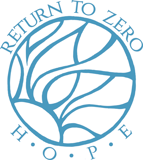
In May of 2020, we were ecstatic to learn that I was pregnant! It was my first pregnancy, and everything was going well until out of nowhere, at my mid-pregnancy anatomy scan, they detected significant developmental problems. Our daughter would never walk, talk, or know who we were. We were faced with a devastating choice: terminate my pregnancy for medical reasons halfway through my second trimester, or carry my pregnancy to term despite our daughter’s life-limiting diagnosis, potentially caring for her for the rest of our lives. It felt like a “no win” scenario, like there was nothing we could do to protect our child. After extensive consideration, and in alignment with our deepest beliefs, we chose to carry. I would carry her as long as I could, to give our baby girl her best chance at life, to show her our love, and to allow her to live out her natural life. We named her Maria Therese.
It felt like all the color had drained from the world. My pregnancy became a very different experience from most: what should have been a time of joyful anticipation became a time of significant anticipatory grief and fear of what was to come. Two resources in particular helped me greatly. The first was a book called “A Gift of Time: Continuing Your Pregnancy When Your Baby's Life Is Expected to Be Brief,” which validated my emotions and helped me understand both what to expect and how to prepare. The second was an organization called “Isaiah’s Promise,” dedicated to supporting families carrying to term despite a life-limiting prenatal diagnosis.
By my third trimester, Maria’s prognosis had worsened, and I prayed that I’d be able to meet her alive. In January 2021, those prayers were answered. Our Maria Therese was born alive, full term, at almost 41 weeks. Hearing her cry in the delivery room was one of the best moments of my life. After a few minutes with us, she was taken to the NICU, where she was closely evaluated for 8 days before being discharged home with us under pediatric palliative hospice care. Maria passed away peacefully in our home in April of 2021 – she was three months and four days old. I miss her every day.
As difficult as our journey has been, I know carrying Maria to term was the right decision for us.
Reflecting back over these past four years, I have felt numerous shifts in my grief over time. First, I experienced anticipatory grief following Maria’s diagnosis, and throughout all of the uncertainty that followed. Then, after she died, I experienced what I can best describe as a “grief fog” in those initial days and weeks. Ever so slowly, as the months wore on, the fog began to dissipate. I began to see more clearly again. Gradually, my body began to physically ache just a little bit less. I was able to make it through an entire day without crying. I began to find joy in small things again. I started to notice the vibrancy of nature again. I started to feel more normal when socializing with family, friends, and acquaintances. While some of these things took months, others took years. Before experiencing this type of loss, I never could have imagined that achieving simple things like this could take so long.
My enduring grief reflects my enduring love.
This year, of all of the things I want to communicate about my loss experience, this stands out the most: my daughter is not a part of my past. She is a part of my present, and I believe she always will be. People, even people I am close with who know our full story, see me as a mother of one because I have one living child. They even refer to my living child as an “only child.” But this is not true. I am actually a mother of two. Death does not sever that bond. Maria continues to be a real, present, and immensely important part of my life.
I have seen first-hand how uncomfortable our society is with grief, especially the out-of-order, “unimaginable,” and persistent life-long grief associated with infant loss. To this day, we still don’t know with certainty why Maria had the congenital problems that she had. We did everything right, and there were still problems. It was completely beyond our control. Acknowledging that this happened to us and that it was totally beyond our control means that it could happen to anyone, which is very hard for most people to accept. It contributes to making this loss journey a very lonely one. I continue to be grateful for the amazing support I have received from RTZ Hope, the beautiful community they have built that I am now a part of, and the work they do to support bereaved families and those who love and care for them.


